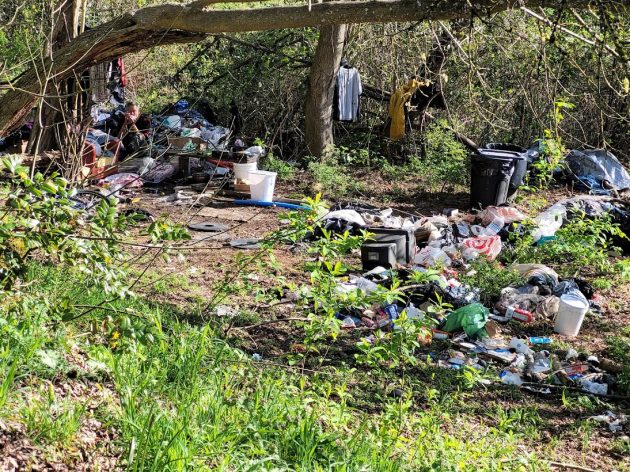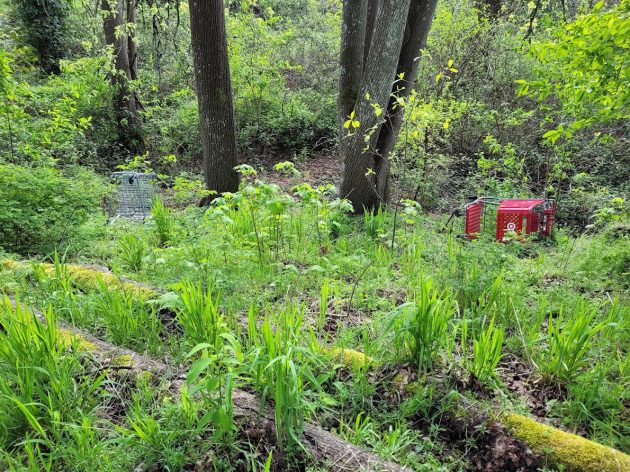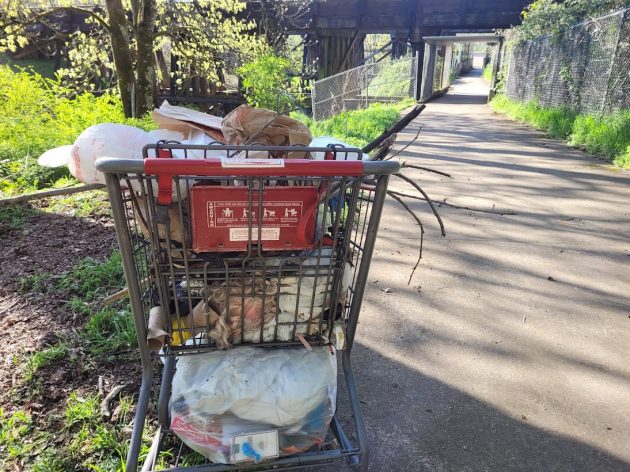
On the banks of Cox Creek: The scene on the afternoon of April 2.
The Cox Creek Path in Albany is about one-third of a mile long and runs from Simpson Park to Salem Avenue. It used to be a scenic segment of Albany’s system of walking and cycling paths. This spring the nature of the scenery has dramatically changed.
There are debris fields associated with squatters’ camps on both sides of the path, barely hidden by the bushes and shrubs. One such area is particularly noticeable. It lies below the path near the banks of Cox Creek.
The last two days, people seemed to have settled on the paved path itself, complete with a fire ring, maybe for cooking or heat. This is directly under one of the trestles that carry Union Pacific and Portland & Western trains across the creek and the path.
If you were trying to find a missing shopping cart lately, the path and the shrubbery on both sides would have been a good place to look. The carts I saw that could be identified were from Target, Winco and Bi-Mart.
All this is taking place along the segment of the path from the trestles to Salem Avenue. In this area, the land on both sides of the path, between the Masonic cemetery and the creek, is within the Albany city limits and belongs to St. John’s Masonic Lodge No. 17, according to the county assessor’s office.
Albany has two privately run nonprofit homeless shelters. Their existence and their work, it seems, has not kept people from living rough along Cox Creek. (hh)

Two shopping carts, one from Target, in the bushes along Cox Creek on April 5.

A Bi-Mart cart on the path on April 2.


I’m amazed at just how much garbage a “homeless” person leaves behind every time they move to their next site.
Good point Hasso and I saw this Facebook post last week from a local non-profit, who I will not name:
“Needs Outreach Volunteers- What does our outreach team do? We go to camps and other locations where people are living and bring them food, clothing, and supplies, as well as offer assistance getting them into housing.”
Yep as I have stated for years, if you enable homeless individuals to live the outdoor camping lifestyle on publicly owned land, then the homeless population will rise. We have two shelters that provide full services for the homeless. Enabling the outdoor camping lifestyle is harming that homeless person, instead of helping them.
Since this local non-profit believes they are helping individuals to live illegally in these camps by bringing them food, clothing and supplies, then they should be bringing garbage bags to clean up their mess and haul it out. Our tax dollars should not be continually spent on enabling this behavior of filth. If their goal is to assist them with housing, then yes yes please do, but do not bring them clothing and supplies. They wear it a few days and it ends up thrown in the river.
When we had shut down Camp Boondoggle in 2006, the campers knew they had no choice but to go to the shelter. Living outdoors was no choice for them anymore and they were able to get jobs and housing. If you enable illegal outdoor camping then why should that individual change their lifestyle? I know some people will use the housing crisis of today as an excuse for camping, but this behavior has been going on for years, way before the rise in housing costs. There was even a high rental vacancy rate in town during the Camp Boondoogle shut down. Also, when I was a kid we had a few homeless individuals in town, but they still worked odd jobs for their food and did not trash public spaces.
If we filled up our town with homeless shelters and tiny homes, there is no guarantee the homeless out in these camps would live in a housing complex that has rules. You would still have individuals who want the camping lifestyle. Just look at Portland!
Some people will be livid over my opinion here, but I have known too many homeless over the years who have died living outdoors, it is very very heart breaking, and if it wasn’t convenient for that lifestyle maybe they would still be alive today. I am glad I never was apart of enabling homelessness and was persistent to every individual I crossed paths with to not live outdoors and to work with our local agencies to make the right choices in their lives. That includes panhandling, that is not a solution to their hurdles in their life that they need to overcome! Hasso, another story for you! I am seeing panhandling in town, again!
Maybe as a city we can think about how to help those people at the same time as keeping our city clean. Like in bigger cities like I just came from like Springfield and Eugene they will offer trash service in areas like that where they will leave a can so they can keep up after theirselves. If someone was to organize a clean up I would be more than happy to bring my children and come volunteer. Or even if someone wanted to help organize take hot meals down there to those folks and think about what kinds of things we could do to help them be more successful and keep our city cleaner
Stacey, in a perfect world that effort should work, but sadly it does not. That effort still enables tent camping. The larger cities have poured millions of dollars into thinking their providing of portable restrooms, trash containers, clean up efforts, etc. will help and all it has done is increase the numbers of homelessness and they still have the trash everywhere. This is not a new issue the city has dealt with, this has gone on for years. But what I have seen is when people or a community enable that lifestyle, then the homeless population rises. Also, it is not up to the City to fund housing. That program is for HUD to provide. Once you go down that path, then you are taking away funds from the core services of the city.
The quickest way to provide needed low-income housing is to purchase existing market rate apartment complexes and transform them into low income housing. It has been done before and is successful.
Thank you for caring about the homeless.
Sharon, please oh please run for mayor again.
I’d love that! There would sure be a lot of local politicians running for cover!
Roman and MarK……thank you for your thoughts! If I did I think the homeless population might run for cover instead. I remember several years ago, I heard from a Corvallis elected official that a homeless person over there said to another, “Don’t go to Albany, you’ll get chewed out by the mayor”. I guess my chit chat with people living in tents or panhandling worked back then! I’m for helping the homeless, but it is their responsibility to help themselves first by moving towards the goal of housing. It takes being a bit assertive and not to just enable their living situation, because that does not work.
Yesterday in Newport on the Bay Front St. there is a pier about mid-way (at 663). It’s where people crab & watch the seals. The three stores there are now closed. Two guys have set up camp on the viewing pier with all their junk!!!! There are “No Alcohol Allowed” signs posted but sure enough empty containers are all around. We need to ship them to the wilds of Australia! The trouble with providing food & “services” is there is no desire for them to move.
I agree with most of what Sharon wrote.
An “enabler” is someone whose behavior allows a loved one to continue self-destructive patterns of behavior.
Don’t give them food. Don’t provide “free” housing.
This isn’t an economic issue. Good money thrown at a bad policy is just a waste.
The root causes of of most homelessness are severe mental illness and/or unaddressed substance use.
That means scarce resources must mostly go to treatment-and-recovery.
One thing that is for certain is that humans produce waste. If you are homeless, and you get a can of soup. You open the can of soup…eat the contents…now what do you do with the can? You toss it. Same thing but worse for fast food, or quick food from corner stores. Each food item comes with plastic, or a spoon, or paper…what do you do with that when you are done eating?
Also, every other supply we use produces some kind of trash. So, if you are living outside, and you produce trash…what do you do with it? A responsible homeless person might find a garbage receptacle. but this takes effort.
I don’t think most of these folks want to live in a trash heap, but it’s part of our society to produce trash.
If the sight of the trash heaps is part of the problem then why not give them garbage bags, and provide for some sort of regular service that picks up the bags. This might put a dent in the unsightly piles of trash that accumulate where the campers live.
However, giving a homeless person garbage bags seems like an easy idea, but you have to remember that garbage bags are a resource. In this climate, plastic is a way to keep things dry, or a way to stay dry on a wet night. Just because we give them trash bags doesn’t mean they will be used for that intended purpose.
Larger items are another story, mattresses, tents, tarps, bikes, and shopping carts. That’s another problem altogether, but it seems that these are the same items that are used and discarded where the homeless live or congregate.
I don’t offer a solution, but I do know that if we (as a society) don’t do something to change their living situation then the trash will continue to pile up. It’s part of modern living to produce waste.
The number of folks “living rough” is a symptom .
The trash piles are a symptom.
The carts are a symptom.
Good-hearted folks who provide living items without performance bounds are indeed enabling. Some may be co-dependent enablers (without that intent).
What to do? Dipped if I know. I’m an engineer with expertise in things known to few and understood by fewer.
The first step in problem-solving is answering a seemingly simple question—what problem are we trying to solve?
BTW, that question is key in route-cause analysis.
My husband and I walk down this path every night. We have gotten used to seeing both the men that have caused this mess. The one right by the creek is Dave and I will say that he does a better job of keeping his area clean. The guy that stays by the cemetery is another story. That man has 4 camps up in there and they all look as bad as you would think…..and he is the one who put the “firepit” under the train.